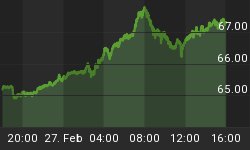Say you're an up-and-coming superpower wannabe with dreams of dominating your neighbors and intimidating everyone else. Your ambition is understandable; rising nations always join the "great game", both for their own enrichment and in defense against other big players.
But if you're Russia or China, there's something in your way: The old superpower, the US, has the world's reserve currency, which allows it to run an untouchable military empire basically for free, simply by creating otherwise-worthless pieces of paper and/or their electronic equivalent. Russia and China can't do that, and would see their currencies and by extension their economies collapse if they tried.
So before they can boot the US military out of Asia and Eastern Europe, they have to strip the dollar of its dominant role in world trade, especially of Middle Eastern oil. And that's exactly what they're trying to do. See this excerpt from an excellent longer piece by Economic Collapse Blog's Michael Snyder:
China and Russia are Ruthlessly Cutting the Legs Out From Under the US Dollar
China and Russia are not the "buddies" of the United States. The truth is that they are both ruthless competitors of the United States and leaders from both nations have been calling for a new global currency for years.
They don't like that the United States has a built-in advantage of having the reserve currency of the world, and over the past several years both countries have been busy making international agreements that seek to chip away at that advantage.
Just the other day, China and Germany agreed to start conducting an increasing amount of trade with each other in their own currencies.
You would think that a major currency agreement between the 2nd and 4th largest economies on the face of the planet would make headlines all over the United States.
Instead, the silence in the U.S. media was deafening.
However, the truth is that both Russia and China have been making deals like this all over the globe in recent years. I detailed 11 more major agreements like the one that China and Germany just made in this article: "11 International Agreements That Are Nails In The Coffin Of The Petrodollar".
A few of the things that will likely happen when the petrodollar dies....
- Oil will cost a lot more.
- Everything will cost a lot more.
- There will be a lot less foreign demand for U.S. government debt.
- Interest rates on U.S. government debt will rise.
- Interest rates on just about everything in the U.S. economy will rise.
So enjoy going to "the dollar store" while you can.
It will turn into the "five and ten dollar store" soon enough.
Some thoughts
Snyder goes on to note that both China and Russia are accumulating gold, which will protect them from the coming currency crisis and give the ruble and yuan greater legitimacy in global trade. In Jim Rickards' book Currency Wars, he tells the story of financial war games conducted by the US military, in which one of the scenarios was a Russian gold backed currency that challenged the dollar. We're apparently not far from that plan becoming feasible.
The US spends a big chunk of its $700 billion a year defense budget on dominating the Middle East in order to force the trading of oil in dollars. Let that trade be diversified into several currencies and the demand for petrodollars goes way down. Central banks and global corporations will sell part of their dollar holdings, sending the dollar's exchange rate into a tailspin. This in turn will make it harder for the US to finance its military empire/welfare state.
The net result: America becomes Spain, no longer able to simply whip out the monetary credit card to cover its overspending. We'll have to live within our means, cutting maybe $3 trillion a year in government largesse (including the growth in unfunded entitlements liabilities).
Cuts on this scale can't be accomplished smoothly, as Europe is discovering. So in this scenario the coming decade will be even messier than the last one, with "Occupy" movements shutting down cities and every election producing incumbent massacres. A combination of higher prices for necessities and lower wages will demote much of the middle class to "working poor."
Meanwhile, China and Russia will reap the rewards of stronger currencies, and will divide (or share) control over their part of the world. It's hard to know who to feel sorrier for, Americans who thought they could depend on government programs for a middle class lifestyle, or the neighbors of China and Russia who will see the relatively light hand of the American empire replaced with something far more atavistic.















